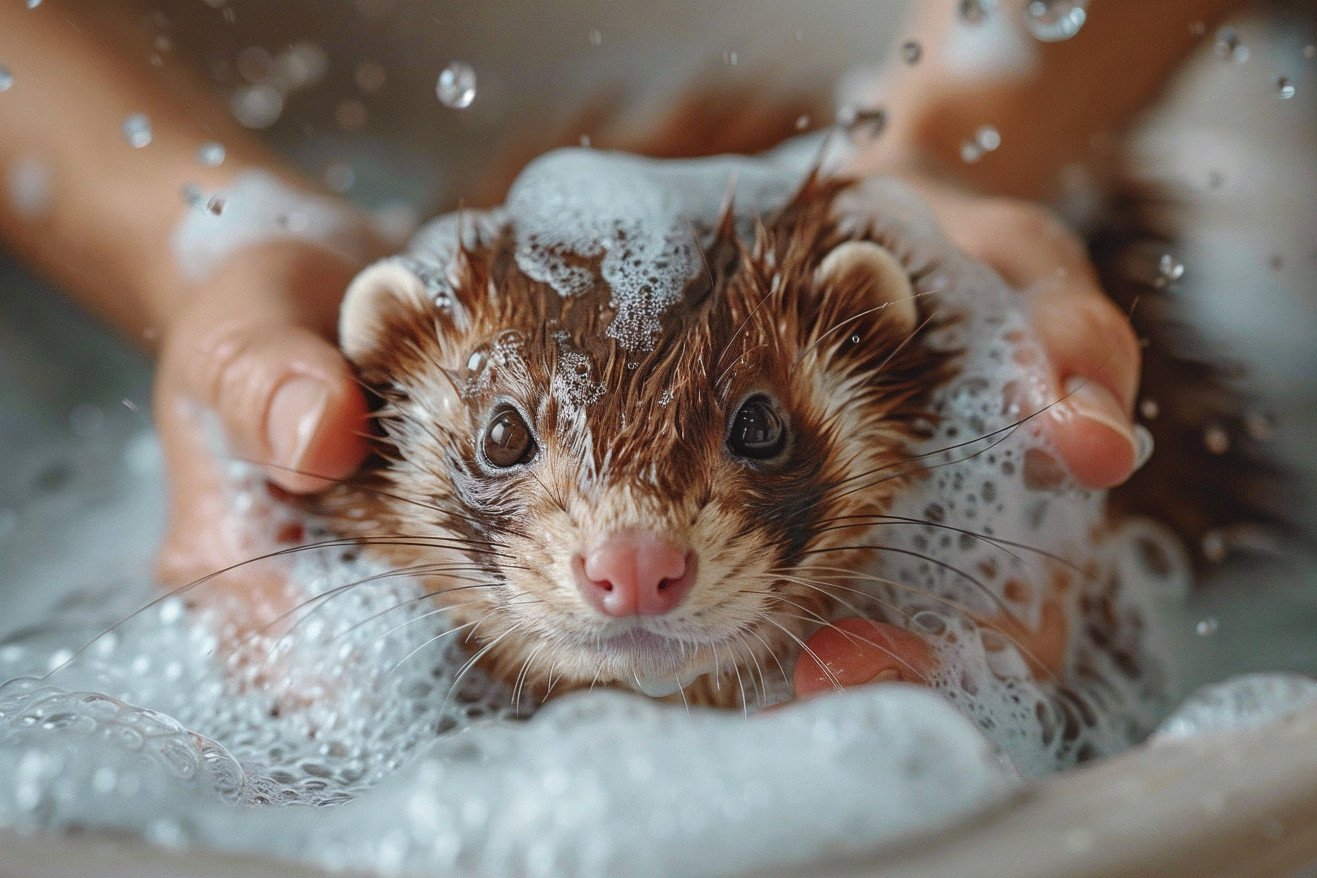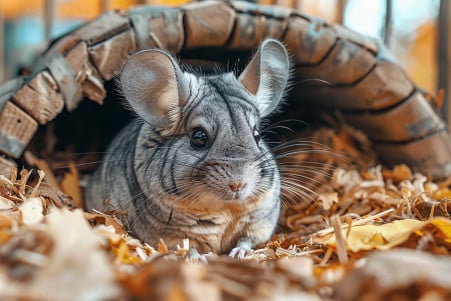Why Do Ferrets Smell? How to Minimize Odor From These Musky Pets
23 March 2024 • Updated 21 March 2024

Ferrets are known for their musky smell, but knowing why ferrets smell and how to take care of them can help you keep the stink to a minimum. Ferrets have scent glands that release oils to help them mark their territory and communicate, and while this is a natural behavior that can't be eliminated entirely, you can reduce the smell by making sure your ferret is properly litter box trained, groomed, and bathed.
Because ferrets are domesticated animals with a history of living in the wild and have some unique physical characteristics, we'll look at research and expert opinions to find out what causes ferret smell and how you can make sure your pet is as comfortable as possible. By learning about ferret biology, behavior, and care, you can learn how to make sure your pet stays happy and smelling good.
Do ferrets smell?
Litter Box Training: The Key to Controlling Ferret Odors
Proper litter box training is crucial for managing the distinct musky odor that ferrets naturally produce. According to PetMD, ferrets can be effectively trained to use a litter box through consistent positive reinforcement techniques. The key is to place litter boxes in the corners ferrets prefer and initially confine them to a smaller space during training.
Serena Fiorella, LVT suggests using a shallow, triangular litter box made specifically for ferrets that can be easily placed in a corner of the cage. She also recommends using unscented, dust-free litters like compressed newspaper or recycled paper pellets, as PetAssure notes that clays and pine litters can irritate ferrets' respiratory systems.
Consistency is key, so make sure to place your ferret in the litter box after they wake up or eat, as this is when they are most likely to go to the bathroom. Make sure to reward your ferret with treats and praise when they use the litter box. WikiHow also suggests leading your ferret to the litter box every 3-4 hours. Make sure to have multiple litter boxes in every room that your ferret has access to, as ferrets are unlikely to go far when they have to use the bathroom. Most importantly, make sure to be patient, as every ferret will learn at their own pace.
By training your ferret to use the litter box from a young age and making sure to clean the litter box regularly to prevent odors, you can make sure that you are able to control the musky odor that your ferret naturally produces. This will also set you up for success when it comes to grooming and maintaining your ferret's habitat to make sure that your furry friend always smells fresh.
Grooming and Bathing: Don't Overdo It
Frequent brushing and occasional baths can help reduce ferret odor by removing excess oils and dander, according to PetMD. However, WikiHow warns that bathing too often can remove the oils that help control odor and lead to even more odor.
To avoid this, PetHelpful suggests using a mild, ferret-safe shampoo and bathing your ferret no more than once a month. In addition, brushing your ferret once a week can help remove loose hair and ensure that their skin oils are evenly distributed. Don't forget to clean your ferret's ears and teeth, too. According to PetMD, ear wax and dental problems can contribute to other sources of odor.
By following these grooming tips and avoiding over-bathing, ferret owners can keep their pets' natural musky odor under control while ensuring their skin and coat are healthy. This will help you move on to the next step - making sure your ferret eats a healthy diet that will help keep them smelling fresh.
Diet and Nutrition: What to Feed Your Ferret to Keep Them Smelling Fresh
A diet that is high in protein and fat and low in fiber can help reduce ferret odor by supporting healthy skin and coat, according to Oxbow Animal Health. The ZuPreem Pet website explains that ferrets are obligate carnivores, so it's important to avoid foods that contain high levels of inappropriate ingredients like corn, peas, and potatoes. Instead, look for a diet that is high in protein and fat and low in fiber.
PetHelpful recommends that you also look into adding supplements like Ferretone or omega fatty acids to help support skin and coat health. It's also important to make sure that your ferret has access to fresh, clean water at all times to ensure that they are properly hydrated. However, Oxbow Animal Health explains that it can take several weeks for dietary changes to affect the amount of odor that a ferret produces, so it's important to be patient and stick to the new diet.
By making sure that your ferret is eating a high-quality, meat-based diet, you can help reduce their natural musky odor while also supporting their overall health and well-being. After diet, the next most important factor in controlling ferret odor is making sure that their living environment is clean.
Cage Cleaning and Environmental Management
In addition to diet, regular cleaning of the ferret's cage and living space is important for managing odors, according to WikiHow. PurrifiedAir says that the cage should be cleaned with a thorough scrub and disinfectant at least once a month, and that bedding should be washed weekly with unscented detergent.
To help with cleaning, The Modern Ferret recommends using materials that are easy to wipe down in the corners where ferrets are most likely to go to the bathroom. Regular vacuuming and dusting of the home can also help to reduce dander and odors in carpets and furniture.
In addition to these measures, PurrifiedAir suggests that air purifiers and odor-eliminating products can be helpful, although they should be kept away from the ferrets. With these measures, the ferret's living space can be kept clean and the strong musky odors can be kept to a minimum.
Descenting and Neutering: Surgical Odor Reduction
Descenting, or the removal of a ferret's scent glands, can help to reduce the musky smell of ferrets, says Oxbow Animal Health. However, the Ferret World website points out that while most pet ferrets in the United States are descented, the procedure doesn't remove all sources of odor.
Neutering or spaying ferrets can also help to reduce odors by decreasing hormone production, according to Oxbow Animal Health. However, both of these procedures should be done by a vet who is experienced in working with ferrets.
While descenting and neutering can help to reduce ferret odor, ZuPreem Pet warns that these procedures don't mean you can skimp on a proper diet, grooming, and habitat care. It's also important to make sure that any health problems that could lead to abnormal odors are treated to ensure that your ferret smells as good as possible.
Health Issues: Dealing With Underlying Problems
There are some health issues that can lead to stronger or different smells in ferrets. According to The Spruce Pets, common ferret diseases like adrenal disease, insulinoma, and gastrointestinal problems can lead to changes in smell. Adrenal gland disease is considered the most common ferret disease and can cause hair loss, vulvar enlargement, and aggression. Insulinomas, which are tumors that cause the body to produce too much insulin, can lead to weakness, lethargy, and seizures. Ferrets are also known to have issues with gastrointestinal obstructions due to foreign body ingestion.
Regular vet visits and making sure to address any health issues that come up are important, as mentioned by Oxbow Animal Health. Dental disease, ear infections, and skin conditions can also lead to smells in ferrets. The Ferret Association of Connecticut emphasizes that it's important to make sure to address underlying health issues for the overall health and smell of ferrets. By making sure to keep an eye on their health, ferret owners can make sure to keep any unusual smells in check.
Conclusion: Learning to Love the Musky Scent of Ferrets
Although ferrets will never be completely odorless, there are many ways to minimize their smell. Regularly training, grooming, feeding, and cleaning up after your ferret are all important in keeping their odor to a minimum. While surgical procedures like descenting and neutering can help, they are not a substitute for the day-to-day care that will keep your ferret smelling fresh.
It's also important to make sure that you're keeping an eye on your ferret's health, as that can also impact their smell. With time and effort, ferret owners can enjoy their musky pets without being overwhelmed by their scent.


